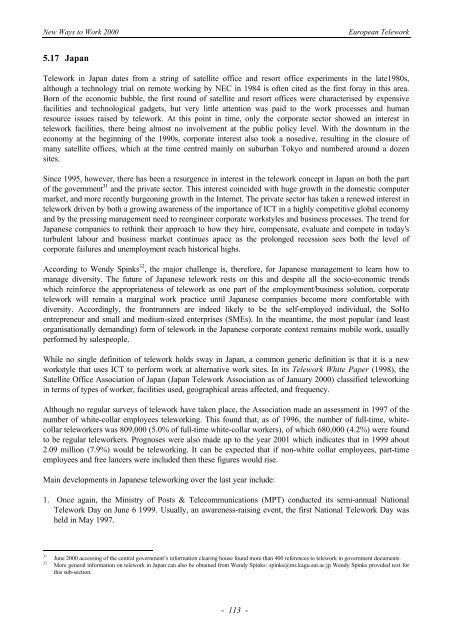eWORK 2000 - European Telework Week
eWORK 2000 - European Telework Week
eWORK 2000 - European Telework Week
- No tags were found...
You also want an ePaper? Increase the reach of your titles
YUMPU automatically turns print PDFs into web optimized ePapers that Google loves.
New Ways to Work <strong>2000</strong><strong>European</strong> <strong>Telework</strong>5.17 Japan<strong>Telework</strong> in Japan dates from a string of satellite office and resort office experiments in the late1980s,although a technology trial on remote working by NEC in 1984 is often cited as the first foray in this area.Born of the economic bubble, the first round of satellite and resort offices were characterised by expensivefacilities and technological gadgets, but very little attention was paid to the work processes and humanresource issues raised by telework. At this point in time, only the corporate sector showed an interest intelework facilities, there being almost no involvement at the public policy level. With the downturn in theeconomy at the beginning of the 1990s, corporate interest also took a nosedive, resulting in the closure ofmany satellite offices, which at the time centred mainly on suburban Tokyo and numbered around a dozensites.Since 1995, however, there has been a resurgence in interest in the telework concept in Japan on both the partof the government 31 and the private sector. This interest coincided with huge growth in the domestic computermarket, and more recently burgeoning growth in the Internet. The private sector has taken a renewed interest intelework driven by both a growing awareness of the importance of ICT in a highly competitive global economyand by the pressing management need to reengineer corporate workstyles and business processes. The trend forJapanese companies to rethink their approach to how they hire, compensate, evaluate and compete in today'sturbulent labour and business market continues apace as the prolonged recession sees both the level ofcorporate failures and unemployment reach historical highs.According to Wendy Spinks 32 , the major challenge is, therefore, for Japanese management to learn how tomanage diversity. The future of Japanese telework rests on this and despite all the socio-economic trendswhich reinforce the appropriateness of telework as one part of the employment/business solution, corporatetelework will remain a marginal work practice until Japanese companies become more comfortable withdiversity. Accordingly, the frontrunners are indeed likely to be the self-employed individual, the SoHoentrepreneur and small and medium-sized enterprises (SMEs). In the meantime, the most popular (and leastorganisationally demanding) form of telework in the Japanese corporate context remains mobile work, usuallyperformed by salespeople.While no single definition of telework holds sway in Japan, a common generic definition is that it is a newworkstyle that uses ICT to perform work at alternative work sites. In its <strong>Telework</strong> White Paper (1998), theSatellite Office Association of Japan (Japan <strong>Telework</strong> Association as of January <strong>2000</strong>) classified teleworkingin terms of types of worker, facilities used, geographical areas affected, and frequency.Although no regular surveys of telework have taken place, the Association made an assessment in 1997 of thenumber of white-collar employees teleworking. This found that, as of 1996, the number of full-time, whitecollarteleworkers was 809,000 (5.0% of full-time white-collar workers), of which 680,000 (4.2%) were foundto be regular teleworkers. Prognoses were also made up to the year 2001 which indicates that in 1999 about2.09 million (7.9%) would be teleworking. It can be expected that if non-white collar employees, part-timeemployees and free lancers were included then these figures would rise.Main developments in Japanese teleworking over the last year include:1. Once again, the Ministry of Posts & Telecommunications (MPT) conducted its semi-annual National<strong>Telework</strong> Day on June 6 1999. Usually, an awareness-raising event, the first National <strong>Telework</strong> Day washeld in May 1997.3132June <strong>2000</strong> accessing of the central government’s information clearing house found more than 400 references to telework in government documents.More general information on telework in Japan can also be obtained from Wendy Spinks: spinks@ms.kagu.sut.ac.jp Wendy Spinks provided text forthis sub-section.- 113 -








